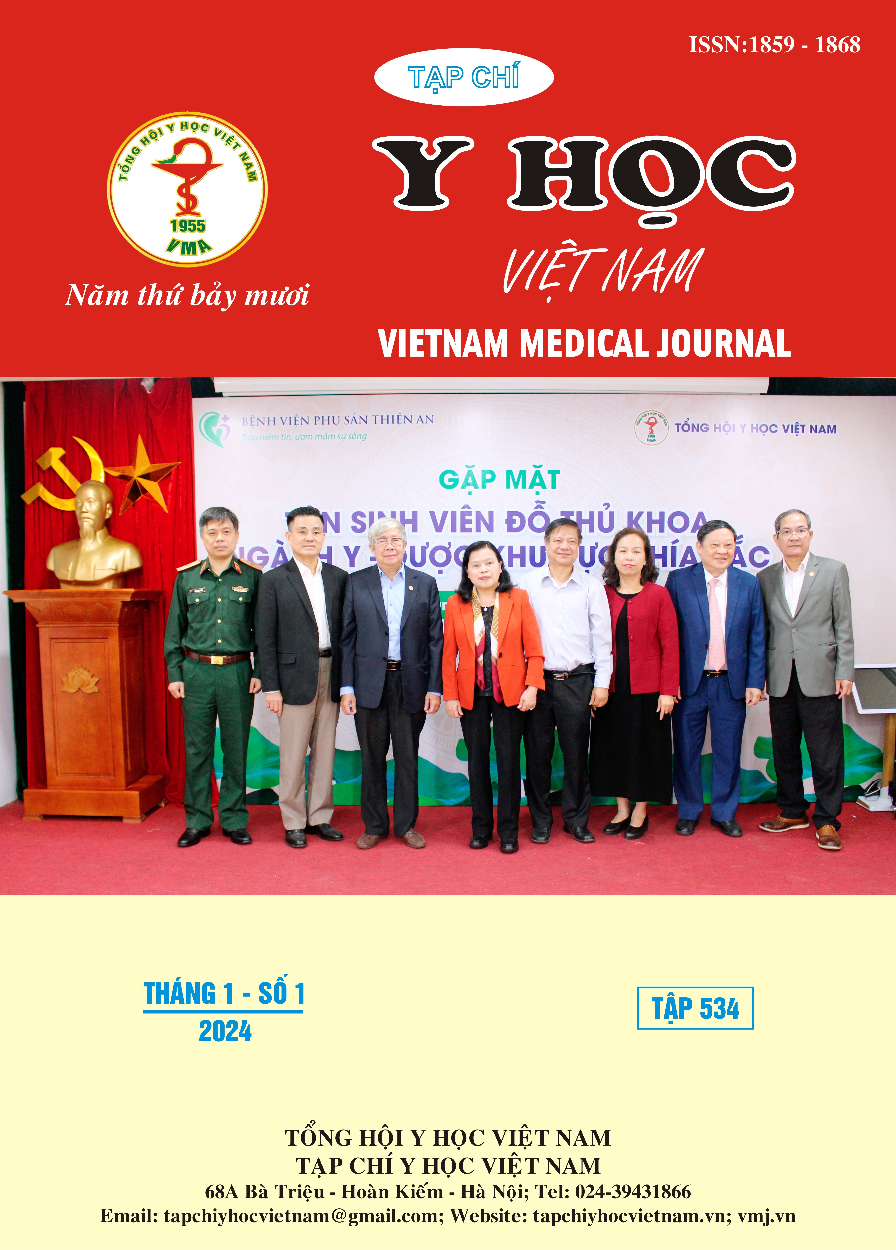INITIAL RESEARCH OF THE PREVALENCE OF AAD GENE CAUSING AMINOGLYCOSIDE RESISTANCE IN COMMUNITY-ACQUIRED INFECTION KLEBSIELLA PNEUMONIAE
Main Article Content
Abstract
Introduction: The antibiotics treating for infections caused by K.pneumoniae in the community is facing many difficulties because this bacteria have increased resistance. Aminoglycoside is one of a group of antibiotics that is widely used in clinical practice with affordable price and is available in many hospitals. However, Aminoglycoside resistance is currently about 40-50% with variety mechanisms. The prevalence of resistance genes, such as aad, play an essential role to develop a test that guide early treatment with Aminoglycosides. Objective: To determine the prevalence of aad genes that resistance to Aminoglycosides in K.pneumoniae causing community-acquired infection at Nguyen Tri Phuong hospital during the period 02-05/2023. Subjects and methods: A case-series study on K.pneumoniae causing community-acquired infections that resistance with Gentamicin and/or Tobramycin. The samples collected from February to May 2023. Real-time PCR was performed to detect three genes belonging to the aad group, including aadB, aadA2 and aadA5. Chi-square test and Fisher’s exact test were used to compare the difference in prevalence of K.pneumoniae strains according to antibiotic susceptibility test and clinical features with p value < 0.05 considered to be statistically significant. Results: During the sampling period, we collected 38 Aminoglycoside-resistant K.pneumoniae strains infected in the community. In which, the resistance rate of Tobramycin, Gentamicin and resistance to both types of Aminoglycosides is 73.7%, 81.6% and 55.3%, respectively. All of them are also the multidrug-resistant strains. The rate of pandurg-resistance, extensively drug-resistant and multidrug-resistance is 7,9%, 47,4% and 44,7%, respectively. The prevalence of aadA2 gene is 94.7%, followed by aadA5 and aadB equal in 89.5%. The majority of K.pneumoniae strains surveyed carried all 3 genes (73.7%) and the remainder carried 2 drug resistance genes (26.3%). The aad genes did not have a statistically significant association with antibiotic susceptibility test and clinical characteristics. Conclusions: Aminoglycoside-resistant K.pneumoniae strains in the community are always accompanied by resistance to many other antibiotics and all of them carried the aadA2, aadA5 and aadB genes. The aad genes have no relation with antibiogram characteristics that suggest for the complicated mechanism of Aminoglycoside resistance. Therefore, more advanced research in the future will be necessary to develop testing to guide the clinical use of Aminoglycosides as well as develop measures to prevent the increased antibiotic resistance in K.pneumoniae in the community.
Article Details
References
2. Barbier, E., et al., The ZKIR Assay, a Real-Time PCR Method for the Detection of Klebsiella pneumoniae and Closely Related Species in Environmental Samples. Applied and Environmental Microbiology, 2020. 86(7):e02711-19.
3. Stedtfeld, R.D., et al., Primer set 2.0 for highly parallel qPCR array targeting antibiotic resistance gens and mobile gentic elements. FEMS Microbiology Ecology, 2018. 94(9):fiy130.
4. Li, B., et al., Analysis of drug resistance determinants in Klebsiella pneumoniae isolates from a tertiary-care hospital in Beijing, China. 2012. 7(7):e42280.
5. Isler, B., et al., High prevalence of ArmA-16S rRNA methyltransferase among aminoglycoside-resistant Klebsiella pneumoniae bloodstream isolates. Journal of Medical Microbiology, 2022. 71(12): 001629
6. Shaw, K.J., P.N. Rather, R.S. Hare, and G.H. Miller, Molecular gentics of aminoglycoside resistance gens and familial relationships of the aminoglycoside-modifying enzymes. Microbiol Rev, 1993. 57(1):138-63.
7. Martin, R.M. and M.A. Bachman, Colonization, Infection, and the Accessory Genome of Klebsiella pneumoniae. Frontiers in Cellular and Infection Microbiology, 2018. 8: p.4.


